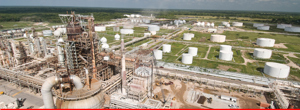US crude rises, gasoline falls as refineries restart
LONDON (Reuters) — US oil prices rose on Tuesday and gasoline fell as the gradual restart of refineries in the Gulf of Mexico that were shut by Hurricane Harvey raised demand for crude and eased fears of a fuel supply crunch.
Gasoline futures dropped around 4% from their last close, to $1.68/gal, down from $2.17 on Aug. 31 and back to levels last seen before Harvey hit the US Gulf Coast and its large refining industry.
US West Texas Intermediate crude futures jumped by almost 3% to $48.64/bbl by 1320 GMT, their highest levels in two weeks, up $1.35 cents from their last settlement.
"Gasoline fell as refineries in Texas began to reopen," said William O'Loughlin, investment analyst at Rivkin Securities.
Texas was edging towards recovery from the devastation of Harvey as shipping channels, oil pipelines and refineries restarted some operations.
Eight US oil refineries with 2.1 MMbpd of refining capacity, or 11.4% of the US total, were shut as of Monday afternoon, the Department of Energy said.
Harvey hit the Texan coast late on Aug. 25 and at its peak knocked out almost a quarter of all US refining capacity.
Another Hurricane—Irma—strengthened on Tuesday into a Category 5 hurricane, the most powerful storm on the Saffir-Simpson scale with sustained winds of over 157 mi/hr.
The US National Hurricane Center’s forecast path for the storm has Irma passing south of Florida on Sunday on its way into the Gulf of Mexico.
Most forecast models show the storm keeping east of the US oil and gas platforms in the Gulf, but the NHC said that it is too early to determine the direct impacts Irma might have on the continental United States.
September is typically the peak of the hurricane season. Another storm is developing behind Irma in the Atlantic, and an area of bad weather in the southwest Gulf of Mexico threatens to become a tropical storm in the next two days.
On international markets, Brent crude futures also rose by 0.9% to $53.23/bbl amid signals the Organization of the Petroleum Exporting Countries could extend its output limits beyond the first quarter of 2018.
A weak US dollar was also supporting oil prices.
Reporting by Dmitry Zhdannikov; Additional reporting by Henning Gloystein; Editing by Dale Hudson and Alexander Smith







Comments